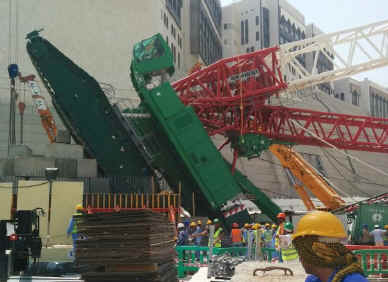
A Saudi court has decided that no one was to blame for the disaster that struck Mecca two years ago when a crane toppled on to the Grand Mosque, killing at least 108 people and injuring more than 200 others. The crane, which had not been properly secured during a storm, was operated by Saudi Binladin, the kingdom's largest construction firm.
On Sunday, the Summary Court in Mecca ruled that the company founded by Osama bin Laden's father has no need to compensate victims or their families, or to pay for damage to the mosque. According to the Saudi Gazette, the court said this is because "the disaster was caused by natural reasons and there was no human element behind it". The news report continues:
"The judge in the case said the court took its decision after thoroughly reviewing technical, engineering, mechanical and geophysical reports in addition to carefully studying the reports of the Presidency of Meteorology and Environment which said it was the heavy rains and thunderous storms that caused the collapse of the crane."
It quotes the court as saying "The crane was in an upright, correct and safe position" and that the Binladin company had taken "all the necessary safety precautions".
The simple fact, though, is that if the crane was upright (and photographs confirm it had been left with its boom and jib fully raised) it cannot have been in a "correct and safe position" for the weather conditions at the time. Winds are said to have been between 50mph and 60mph, which is a Force 10 storm on the Beaufort Scale.
A lot of construction work had been taking place around the Grand Mosque and photographs show 20 or more fixed "tower" cranes in the area which survived the storm intact. However, the crane in question was of a different type. It was a Liebherr LR-11350 crawler crane, fitted with caterpillar tracks for moving around the site, and standing 200 metres tall.
Cranes are designed not to topple forward when lifting heavy weights but mobile cranes, if not properly handled, have a tendency to topple backwards – which is what happened in Mecca. An article for an engineering blog explains the problem:
"Backward stability for cranes has always been a serious consideration and often misunderstood or overlooked. The tendency is to carefully study the capacity charts to assure frontward stability when planning a lift.
"It is somewhat counter intuitive to worry about backward stability as all the lifting is being done over the front. In fact, there are almost as many crane accidents that are a result of 'loss of backward stability' as there are for all the rest combined.
"All mobile cranes are subject to a loss of backward stability ..."
Shortly after the disaster, experts from Liebherr reported that the crane, which was used only sporadically, had not been correctly prepared for the expected weather conditions:
“The operating instructions of the LR 11350 and the associated wind speed charts show that the crawler crane could not withstand such a high wind loading and that the boom should have been lowered to the ground preventatively to avoid the tilting of the crawler crane ...
“The high winds caused the crane to tilt over the last support rollers of its crawler tracks.”
The Saudi authorities took a similar view. A report to the king suggested the manufacturer's instructions had not been followed and that the crane had been left in a vulnerable position. As a result of that, the Binladin company was banned (temporarily) from taking on any new government contracts and its senior executives were forbidden to leave the country.
Two months after the disaster the Saudi authorities also issued new rules for crane operators. One of them said contractors should "check wind speeds to ensure that they are always within the safe levels as laid down by the manufacturer".
Repeated acquittals
Since then, though, Saudi Arabia's courts – which are not normally noted for their leniency – have been reluctant to find any fault with the Binladin company.
Fourteen people connected with the company were initially put on trial last year, accused of “negligence leading to death, damaging public property and ignoring safety guidelines”. None were named but local media said they included at least one Saudi billionaire and nationals from Pakistan, the Philippines, Canada, and several Arab countries.
During a series of hearings, one defendant reportedly told the court that none of the operators and support staff had seen an operating manual and some of them were not even aware that one existed.
Eventually the court decided it had no jurisdiction to rule on allegations of “safety breaches” and dismissed the charges against 13 of the defendants (there has been no further mention of the fourteenth defendant).
The Saudi attorney general appealed against the verdict and in May this year a retrial was ordered.
Mecca's criminal court then considered the case for a second time and, once again, acquitted all thirteen. The reason given on that occasion was that the defendants were not aware of the weather at the time of the crane's collapse.
The attorney general is said to be appealing against that decision and also has 30 days to appeal against this week's ruling on compensation.
In the immediate aftermath of the disaster King Salman ordered payments of one million riyals ($266,000) to the family of each person killed and half that amount for anyone who was seriously injured. The Saudi Gazette describes this as a "gesture" by the king which is unconnected with the legal issue of compensation by Binladin.
Two years on, however, it is still unclear how much of the king's money has been paid out. In Malaysia, for example, the families of seven victims are reported to be still waiting.


 RSS Feed
RSS Feed
